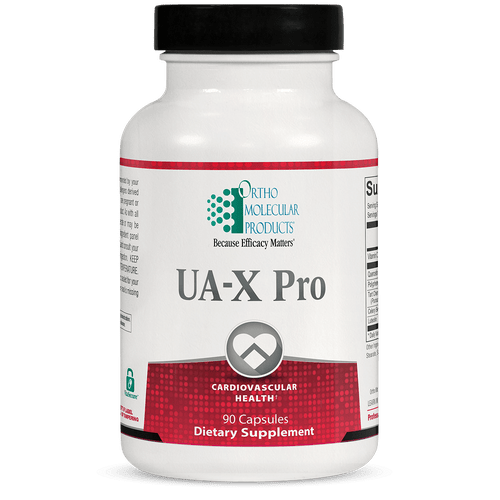
Product Description
UA-X Pro
UA-X Pro provides a powerful formula for those seeking to minimize uric acid and optimize cardiovascular wellness.
Product Overview
Clinical Applications
- Supports Healthy Uric Acid Levels
- Promotes Urinary Alkalization for Healthy Uric Acid Metabolism
- Helps Maintain Healthy Liver Enzymes Involved in the Production of Uric Acid
More than a century ago, Scottish physician Alexander Haig sounded the alarm about the connection between uric acid levels in the body and cardiovascular health. Uric acid is the end item of purine metabolism in the human body and originates from catalysis by xanthine oxidase (XOD). Uric acid has a variety of physiological effects, including modulation of immune responses, regulation of blood pressure, and controlling the balance between antioxidants and prooxidants in the body. It is important to note that either overgeneration or reduction of uric acid can lead to an overabundance of uric acid.
The prevalence of uric acid in the population has increased rapidly in recent years and has a closely interdependent relationship with certain metabolic health challenges. According to the NHANES study, uric acid prevalence rates in the United States is 20.2% in men and 20.0% in women. Furthermore, serum uric acid is an independent biomarker of cardiometabolic health. Studies have clearly shown an association between increased uric acid concentrations and oxidative stress. This has been shown to be linked to cardiovascular health challenges. Reactive oxygen species (ROS) are generated in tandem with uric acid production; therefore, uric acid causes endothelial changes that require a large pool of antioxidants. Uric acid also modulates vascular endothelial function through the downregulation of nitric oxide production. UA-X Pro was crafted specifically to regulate both the production and the excretion of uric acid by supporting key metabolic enzymes in the liver and stimulating uric acid transporters in the kidney.
Suggested Use:
3 capsules per day or as recommended by your health care professional.
Benefits
Vitamin C
Vitamin C has long been known for its benefits in supporting the immune system. Vitamin C must be obtained from food because the human body cannot manufacture this nutrient. In a meta-analysis of randomized controlled trials containing 1013 participants, pooled findings showed that vitamin C supplementation has a significant impact on lowering serum uric acid levels. Furthermore, a 20-year study published in the Archives of Internal Medicine that including almost 47000 males found that those taking vitamin C had a 44% reduced incidence of uric acid.
Quercetin Dihydrate
Quercetin is an important dietary polyphenol, a family of micronutrients that includes flavonoids, which have potent antioxidant properties and help to maintain normal inflammatory balance. It also acts as an immune regulator that may reduce the development of cellular oxidative damage. Quercetin is found in a variety of botanicals as well as vegetables and fruits, including apples, berries, onions, broccoli, and green leafy vegetables. Quercetin inhibits advanced glycation end products (AGEs), which are harmful oxidative byproducts formed in the body because of overactive chemical reactions. Most importantly, quercetin has been shown to inhibit the actions of xanthine oxidoreductase (XOR), which is the rate-limiting step in the body’s production of uric acid. In a prominent 2016 study of healthy adults, a month of daily quercetin at 500 mg resulted in significantly lowered uric acid levels. Additionally, a study of individuals at risk for cardiovascular challenges showed a statistically significant effect of quercetin supplementation in maintaining blood pressure within the normal range.
Luteolin
Luteolin is naturally concentrated in many fruits and vegetables, such as citrus fruits, broccoli, and green peppers, and herbs, such as thyme, rosemary, and oregano. Certain bioactive compounds in these plants and herbs inhibit the XOR enzyme. In fact, luteolin has been shown to have uric acid-lowering properties comparable to traditional therapies. In a 2017 double-blind, placebo-controlled study of people with uric acid, it was found that ingestion of luteolin for four weeks reduced serum uric acid levels. Flavonoids are further known for their ability to help maintain normal inflammatory balance and antioxidant properties, and luteolin, specifically, has been shown to be liver protective against uric acid free radical stress.
Tart Cherry
Tart cherries are known to contain anthocyanins and are believed to have many health benefits, including reducing oxidative stress and uric acid levels. One study shows that a low dose of tart cherry powder decreasing serum uric acid and supporting kidney function. Additionally, a 2021 study with 48 participates found that tart cherry ingestion can transiently decrease uric acid and a single powdered capsule is most effective for lowering uric acid.
Xanthine Oxidase Inhibitors: Celery Seed Extract and Apple Polyphenols
Celery is an umbelliferous plant that has been shown to reduce uric acid levels and help maintain normal inflammatory balance. Specifically, celery seed in an aqueous extract (CSAE) has been shown to reduce the levels of XOD. In addition, CSAE reduced the levels of reactive oxygen species and increased the serum levels of superoxide dismutase and glutathione peroxidase. More so, in a randomized, double-blind, parallel placebo-controlled clinical trial involving 62 volunteers randomized to 300 mg of apple polyphenols extract found a positive effect on vascular oxidative stress, endothelium function, and maintenance of healthy blood sugar levels by inhibiting XOD.












